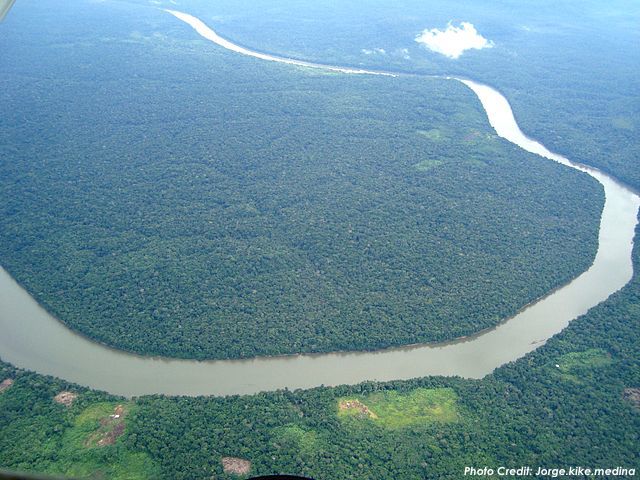
Here’s another story along the lines of the First Nations resistance in British Columbia, Canada, to oil pipeline construction on traditional lands… “Amazon residents resort to militias to keep out illegal loggers” – Washington Post:
A beat-up sign on the edge of this Amazon reserve warns strangers not to enter. For years, loggers ignored it and barreled straight into the protected indigenous territory, cutting tracks ever deeper into the diminishing forest.
But on a recent day, visitors approaching Juçaral village, just inside the reserve, encountered an improvised checkpoint operated by a militia called the Guardians. Wearing disheveled uniforms and face paint, members of the 48-man militia sauntered out, shotguns in hand, to check every arriving vehicle.
The Guardians are one of two indigenous groups on this eastern fringe of the Amazon that have taken radical action to reduce illegal logging. They have tied up loggers, torched their trucks and tractors, and kicked them off the reserves.
As a result, such logging has sharply declined in these territories. But the indigenous groups have faced reprisal attacks and death threats for their actions, raising fears of more violence in an area known for its lawlessness.
The clashes highlight the continuing grave threat to the Amazon, the world’s biggest remaining rain forest, which plays a crucial role in maintaining the world’s climate and biodiversity. From 2005 to 2012, deforestation plunged in Brazil, as the government increased its conservation efforts and cracked down on illegal loggers. But since then, the numbers have begun to creep up again. In 2014 alone, almost 2,000 square miles of Amazon rain forest were cleared by farmers, loggers and others.
Indigenous groups play an important role in preserving Brazil’s Amazon rain forest; their reserves make up roughly one-fifth of its area. Silvio da Silva, a village chief from Arariboia and an employee of the Brazilian government’s indigenous agency, said that a year ago as many as 130 logging trucks left the southern end of this reserve a day. Thanks to the Guardians, that has fallen to around 10 to 15 trucks a day.
In a rare visit to the reserves permitted by the indigenous tribes, Washington Post journalists found that many residents support the militias. But others are uneasy about relying on informal armed groups to resolve a problem that should fall to the Brazilian government.
Continue reading this feature…
In many cases, they have used mild force to restrain loggers and block their activities. This has, of course, been met with violent reprisals and assassinations of indigenous leaders and activists.
18% of the pre-1970 Brazilian Amazon had been cut down as of 2013. Massive clear-cutting began in 1970 and has played a crucial role in Brazil becoming the world’s seventh-largest greenhouse gas emitter.
The Amazon rainforest is being cleared for timber, mining, soybean farming, sugar plantations and cattle grazing, as well as to assert legal claims to property by showing “development” on the land.
Brazil’s government has taken steps to make significant reductions in yearly deforestation, but these efforts will need to be sustained consistently and more deeply — and thus far they have not been. Brazil’s climate action plan released in September 2015 is a continuation of its recent strong emissions cuts, but its deforestation pledge only tackles illegal logging, not vast legal timber harvests. And even the illegal logging clearly isn’t close to under control as the Washington Post feature quoted above proves.





